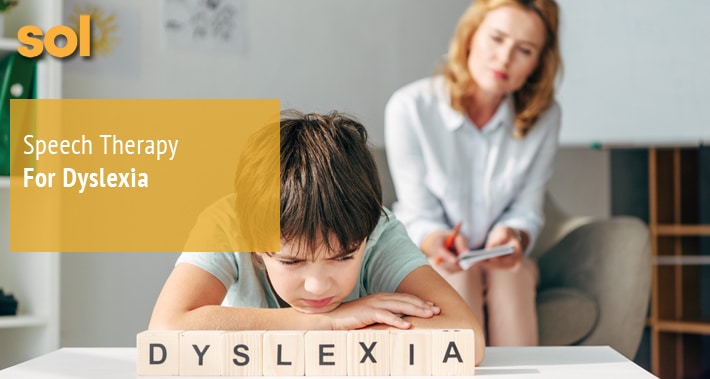
Have you noticed that your child is struggling to read and process language?
Or maybe they are getting poor grades in school despite paying attention, working hard and trying their best.
It’s possible your child might have a speech or language disorder, like dyslexia.
Dyslexia is a common learning disability that can affect your child’s reading ability and language development.
There are many ways to support a child with dyslexia, including speech therapy for kids with dyslexia.
At Sol Speech and Language Therapy, you have the option for in person therapy at one of our clinics or via teletherapy.
Now, what does it mean if your child has dyslexia, and what can you do about it?
Keep reading to find out more dyslexia and how speech therapy can help.
What Is Dyslexia?
Dyslexia is a learning disability that affects your ability to read, spell, write, and speak.
Children with dyslexia may have trouble connecting the letters they see to the sounds those letters make.
Dyslexic children, however, are often very intelligent, capable, and hardworking.
About 5% to 10% of Americans have some symptoms of dyslexia, such as slow reading, trouble spelling, or mixing up words.
Dyslexia can also affect adults, which means speech therapy for adults sometimes focuses on dyslexia as well.
Some people are diagnosed as children, and others don’t realize that they are dyslexic until they are older.
It’s important to note, though, that these difficulties do not affect general intelligence.
According to a National Institute of Health study, dyslexic people are, on average, no more or less intelligent than their non dyslexic counterparts.
Dyslexia Symptoms
Dyslexic children often have normal vision and are just as smart as their peers.
But they struggle more in school because it takes them longer to read.
Dyslexia leads to trouble processing words, which can also make it hard to spell, write, and speak clearly.
You might notice that your child has more difficulty understanding something they’ve read themselves than they do something read aloud.
The may also be slow to develop phonological awareness skills, such as rhyming, segmenting words and blending sounds.
Children with dyslexia might also have difficulty pronouncing certain sounds, naming the letters of the alphabet, and writing letters and numbers backwards persistently (e.g., ‘b’ and ‘d’, or ‘p’ and ‘q’).
Dyslexic kids also tend to make inconsistent spelling errors and are better at answering questions verbally than writing answers.
Dyslexia is different for everyone.
Some people have a mild form that they eventually learn how to manage.
Others have a little more trouble overcoming it.
Even if children aren’t able to fully outgrow dyslexia, however, they can still succeed in life.
What Causes Dyslexia?
Dyslexia is generally thought to be a genetic condition, which is why it often runs in families.
You’re more likely to have dyslexia if your parents, siblings, or other family members also have dyslexia.
The condition stems from differences in parts of the brain that process language.
There are particular parts of the brain that activate when most of us read, but imaging scans show this isn’t true for dyslexic people.
The difficulty reading words is often caused by a deficit in the phonological component of language.
This means dyslexic people may find it difficult to understand how sounds go together to form words.
Someone who has difficulty reading printed words may also have difficulty comprehending what they’ve read, even if they successfully read the words.
The reason for this is that they often have to stop and sound out words, and so can forget what they have just read.
Dyslexia can co-occur with other disorders as well.
Dyslexia is more common in kids with childhood apraxia of speech, for example.
As well, speech therapy for autistic children and adults often focuses on addressing dyslexia as well since they’re often overlapping.
RELATED: FAQ About Autism Spectrum Disorder
How Can Speech Therapy For Dyslexia Help?
Since dyslexia is a disorder that makes it hard for people to read and write, you might be wondering how speech therapy can help.
But, recent studies support that speech therapy can be very beneficial for children with dyslexia.
It can also help reduce your child’s anxiety by incorporating the practice of mindfulness in challenging activities.
There are several ways that a speech pathologist can help support your dyslexic child.
Read more about some of those ways below.

1. Working With Speech Sound Difficulties
A child who is having trouble with speech sounds due to phonological awareness difficulties will have trouble producing all the sounds in certain categories.
This is called a speech sound disorder.
A speech therapist can identify patterns in a child’s speech, for example they may replace all long sounds (sounds that can be held out like ‘s’) may be replaced with shorter sounds (like ‘t’).
The child could have one sound error pattern, or they may have several going on at one time, which can make the speech very difficult to understand.
For a person who struggles with speech sounds, a speech and language therapist should be your first port of call to support them.
2. Working With Memory Difficulties
Dyslexia can also affect memory.
Some children can remember more information than others, but kids with dyslexia often remember less information than others who don’t have dyslexia.
People with difficulties with their short term memory find it harder to recall and repeat spoken information.
For example, a dyslexic child who is asked to repeat something their teacher just said may not be able to find the words to do this, even though they were listening and paying attention.
The more a word is repeated, the easier it will be for the person to remember it.
This difficulty with recalling spoken information is also a reason why a person with dyslexia will find learning another language more difficult.
A speech therapist can provide tips on how to improve a child’s working memory and recommend exercises to do at home and at school to strengthen you child’s memory skills.
One example of this is reading to your child, which can help with auditory comprehension and memory improvement.
3. Increasing Phonological Awareness
Phonological awareness refers to the ability to understand the sounds that make up language.
When a child begins learning to read, it is important for them to make the link between the correct sound and the individual letters and letter combinations in order to sound words out.
People who have dyslexia usually find rhyming and language play more difficult than their peers.
They often struggle with sequencing sounds and may struggle with games where they need to change the middle vowel or use the beginning of one word with a new ending.
Speech and language therapists have a lot of knowledge around the development of phonological awareness skills and several of these skills have been linked to success in learning to read and spell.
Children who require speech therapy are more likely to develop reading problems later on, so developing strong phonological awareness skills in children with speech delays can be helpful when learning to read.
Speech therapists can help your child practice their phonological skills through play and language games, and can recommend activities for you to do at home with them like blowing bubbles or the learning piggy bank.
4. Working With Word Finding Difficulties
Due to the way people with dyslexia store language in the brain, many children with dyslexia experience the feeling of having a word on the tip of the tongue but find themselves unable to think of it.
This is one of the symptoms of a word finding difficulty and studies in applied linguistics have revealed that the way in which we store words in our vocabulary is through word-initial sounds.
Word finding difficulties aren’t the same as having a lack of vocabulary knowledge, as the child knows the word, but can’t remember it in the moment.
Speech and language therapists work with many children who have difficulties in this area and use strategies to help the child retrieve the word.
Book Your Appointment With Sol Speech And Language Therapy Today
If you’d like to learn more about how speech therapy can support your dyslexic child, book a consultation with Sol Speech And Language Therapy today.
Our team of therapists are trained to help children with dyslexia overcome their language difficulties.
They may recommend moving forward with a full speech and language evaluation depending your child’s symptoms.
During your consultation, you’ll have the chance to talk to your child’s speech therapist and they will work with you to understand your child’s unique challenges and help set manageable goals.
Book your appointment with Sol Speech And Language Therapy today.
6448 E Hwy 290 Suite E-108,
Austin, TX 78723
(512) 368-9488
» https://g.page/r/CfRfhOpEQm7BEAE
Sol Speech & Language Therapy
555 Round Rock W Dr E-221,
Round Rock, TX 78681
(512) 808-3953
» https://g.page/r/Cb5pwCTosSEfEBM
Sol Speech & Language Therapy offers personalized skilled intervention to those struggling with their speech and language skills. Services offered include screening, consultation, and comprehensive evaluation. We also provide one-on-one and/or group therapy for speech sound disorders, receptive/expressive language delay/disorder, stuttering/cluttering, accent reduction, and much more.